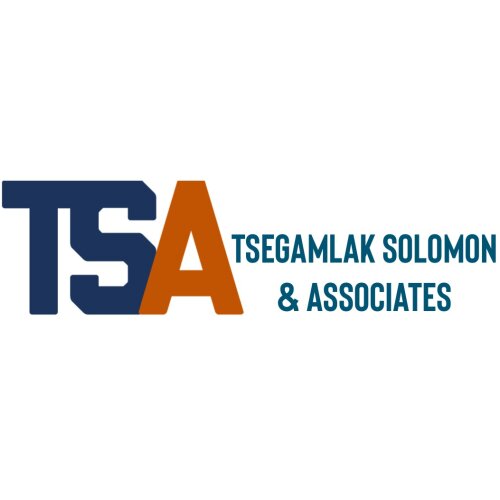Best Tax Lawyers in Addis Ababa
Share your needs with us, get contacted by law firms.
Free. Takes 2 min.
List of the best lawyers in Addis Ababa, Ethiopia
About Tax Law in Addis Ababa, Ethiopia
Tax law in Addis Ababa, Ethiopia, is governed by both federal and regional legal frameworks. The Ethiopian Revenue and Customs Authority (ERCA) oversees the implementation and enforcement of tax laws across the country. Taxation is a crucial part of governance as it funds government projects and public services. In Addis Ababa, like the rest of Ethiopia, taxes include income tax, VAT (Value Added Tax), customs duty, and excise taxes, among others. Taxpayers range from individual employees to large corporations, each subject to specific obligations and rates determined by the national tax legislation.
Why You May Need a Lawyer
There are several situations where you might require legal assistance with taxes in Addis Ababa. Navigating the complexities of tax filing, understanding tax liabilities, and responding to audits or disputes can be challenging. Common scenarios include:
- Business Formation and Compliance: When starting a new business, a lawyer can help ensure compliance with tax systems.
- Tax Audits: If the ERCA audits you or your business, legal advice can be crucial in preparing the necessary documentation and response.
- Dispute Resolution: A tax lawyer can represent your interests in disputes over tax assessments or penalties.
- Tax Planning: Legal experts can provide advice on minimizing tax liabilities within the legal framework.
- Employment Tax Issues: Clarifying obligations related to employee taxes to avoid future legal complications.
Local Laws Overview
In Addis Ababa, the tax laws cover a broad array of areas, with some key aspects as follows:
- Income Tax: Levied on all individuals earning an income within Ethiopia. Rates vary based on income brackets.
- Value Added Tax (VAT): A 15% tax on goods and services, applied at various stages of production and distribution.
- Customs Duty: Applied to imported goods, which can vary significantly based on product type.
- Business Profit Tax: Corporations and business entities are taxed on their profits, with various allowable deductions.
- Excise Tax: Specific tax on certain goods like tobacco, alcohol, and vehicles.
Frequently Asked Questions
What is the deadline for filing taxes in Addis Ababa?
The fiscal year in Ethiopia typically runs from July 8 to July 7, of the following year. Taxpayers generally must file their taxes based on this schedule, but specific deadlines can vary based on the type of tax.
How are tax rates determined in Ethiopia?
Tax rates are predefined by the Ethiopian government and vary based on income levels, type of business, and specific tax categories such as VAT or excise duties.
What are the penalties for not paying taxes on time?
Penalties can include fines, interest on the overdue amount, and potential legal action. It is crucial to pay taxes promptly to avoid such penalties.
Can I appeal a tax assessment?
Yes, if you believe there has been an error in your tax assessment, you are entitled to file an appeal with the tax authorities.
What documentation do I need to provide during a tax audit?
Documentation typically includes financial statements, invoices, receipts, payroll records, and any other documents that justify your reported income and claimed deductions.
Do I have to pay taxes if my business operates at a loss?
Even if operating at a loss, businesses must file a tax return. It may be possible to carry forward the loss to offset future profits.
Are there any tax exemptions available?
Yes, certain sectors may qualify for tax exemptions or incentives, especially those in energy, export, and manufacturing. Consult a tax professional for advice on eligibility.
How does the tax authority ensure compliance?
The Ethiopian Revenue and Customs Authority enforces compliance through audits, assessments, and regular monitoring of financial activities.
What should I do if I can’t pay my tax bill on time?
Contact the ERCA immediately to discuss possible payment arrangements or extensions to ease financial burdens. Early communication is key.
What is the role of digital sales platforms in taxation?
E-commerce platforms must comply with tax regulations applicable to other businesses, including VAT and any applicable digital service taxes.
Additional Resources
Here are some resources that can assist you with tax-related inquiries:
- Ethiopian Revenue and Customs Authority (ERCA): The primary body for tax collection and enforcement.
- Ministry of Finance: Offers insights and publications on fiscal policies.
- Ethiopian Investment Commission: For businesses seeking information on tax incentives and exemptions.
- Chambers of Commerce: A great resource for businesses to get support and advice.
Next Steps
If you need legal assistance with taxes in Addis Ababa, consider doing the following:
- Identify Your Needs: Clearly define what assistance you require, whether it's filing, audit assistance, or dispute resolution.
- Consult a Tax Lawyer: Reach out to a lawyer who specializes in tax to discuss your situation and get expert advice tailored to your circumstances.
- Gather Necessary Documents: Ensure you have all relevant financial records and documentation ready for your legal consultation.
- Stay Informed: Regularly check updates from ERCA and other relevant agencies to stay abreast of any changes in tax laws.
- Consider Long-term Planning: Work with your legal adviser to develop a tax strategy that minimizes liabilities and complies with local regulations.
Lawzana helps you find the best lawyers and law firms in Addis Ababa through a curated and pre-screened list of qualified legal professionals. Our platform offers rankings and detailed profiles of attorneys and law firms, allowing you to compare based on practice areas, including Tax, experience, and client feedback.
Each profile includes a description of the firm's areas of practice, client reviews, team members and partners, year of establishment, spoken languages, office locations, contact information, social media presence, and any published articles or resources. Most firms on our platform speak English and are experienced in both local and international legal matters.
Get a quote from top-rated law firms in Addis Ababa, Ethiopia — quickly, securely, and without unnecessary hassle.
Disclaimer:
The information provided on this page is for general informational purposes only and does not constitute legal advice. While we strive to ensure the accuracy and relevance of the content, legal information may change over time, and interpretations of the law can vary. You should always consult with a qualified legal professional for advice specific to your situation.
We disclaim all liability for actions taken or not taken based on the content of this page. If you believe any information is incorrect or outdated, please contact us, and we will review and update it where appropriate.

















